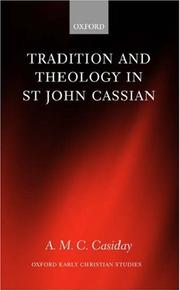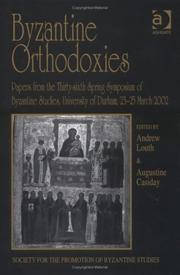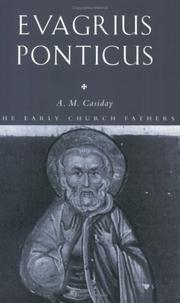| Listing 1 - 10 of 11 | << page >> |
Sort by
|
Book
ISBN: 9780521896801 0521896800 9781139051347 9781107249868 1107249864 1139051342 1139888099 1107241049 1107250692 1107248205 1107247373 1107249031 1299772552 Year: 2013 Publisher: Cambridge Cambridge University Press
Abstract | Keywords | Export | Availability | Bookmark
 Loading...
Loading...Choose an application
- Reference Manager
- EndNote
- RefWorks (Direct export to RefWorks)
Evagrius Ponticus is regarded by many scholars as the architect of the eastern heresy Origenism, as his theology corresponded to the debates that erupted in 399 and episodically thereafter, culminating in the Second Council of Constantinople in 553 AD. However some scholars now question this conventional interpretation of Evagrius' place in the Origenist controversies. Augustine Casiday sets out to reconstruct Evagrius' theology in its own terms, freeing interpretation of his work from the reputation for heresy that overwhelmed it, and studying his life, writings and evolving legacy in detail. The first part of this book discusses the transmission of Evagrius' writings, and provides a framework of his life for understanding his writing and theology, whilst part two moves to a synthetic study of major themes that emerge from his writings. This book will be an invaluable addition to scholarship on Christian theology, patristics, heresy and ancient philosophy.
Evagrius, --- 276 =75 EVAGRIUS PONTICUS --- Griekse patrologie--EVAGRIUS PONTICUS --- Euagrios, --- Evagre, --- Evagriĭ, --- Evagrios, --- Evagrius Ponticus, --- Arts and Humanities --- Religion --- Evagrius, - Ponticus, - 345?-399.
Digital
ISBN: 9781139051347 Year: 2013 Publisher: Cambridge Cambridge University Press
Abstract | Keywords | Export | Availability | Bookmark
 Loading...
Loading...Choose an application
- Reference Manager
- EndNote
- RefWorks (Direct export to RefWorks)

ISBN: 9780199297184 0199297185 0191711381 1281155152 9786611155155 1435623010 0191538086 Year: 2007 Publisher: Oxford Oxford University Press
Abstract | Keywords | Export | Availability | Bookmark
 Loading...
Loading...Choose an application
- Reference Manager
- EndNote
- RefWorks (Direct export to RefWorks)
Christian church history --- Cassian, John --- Church history --- Eglise --- Histoire --- Cassian, John, --- 276 =71 JOANNES CASSIANUS --- Latijnse patrologie--JOANNES CASSIANUS --- Apostolic Church --- Christianity --- Church, Apostolic --- Early Christianity --- Early church --- Primitive and early church --- Primitive Christianity --- Fathers of the church --- Great Apostasy (Mormon doctrine) --- Casiano, Juan, --- Cassià, Joan, --- Cassian, Johannes, --- Cassiano, Giovanni, --- Cassianus, Joannes, --- Cassianus, Johannes, --- Cassien, Jean, --- Johannes, --- John, --- John Cassian, --- Kassian, Ioann, --- Kāsyān, Yūḥannā,

ISBN: 0754654966 9780754654964 9781315261027 1315261022 9781138264991 9781351953801 135195380X 9781351953818 1351953818 9781351953795 1351953796 Year: 2006 Volume: 12 Publisher: London: Routledge,
Abstract | Keywords | Export | Availability | Bookmark
 Loading...
Loading...Choose an application
- Reference Manager
- EndNote
- RefWorks (Direct export to RefWorks)
Orthodox Eastern Church --- Congresses. --- Byzantine Empire --- Empire byzantin --- Church history --- Histoire religieuse --- Congrès --- Conferences - Meetings --- Congrès --- Byzantine orthodoxies --- Byzantium (Empire) --- Vizantii︠a︡ --- Bajo Imperio --- Bizancjum --- Byzantinē Autokratoria --- Vyzantinon Kratos --- Vyzantinē Autokratoria --- Impero bizantino --- Bizantia --- Eglise byzantine --- Byzantine Empire - Church history - Congresses
Book
ISBN: 9780415455169 9780203119389 9781136314803 9781136314841 9781136314858 9781138109957 Year: 2010 Publisher: London ; New York Routledge
Abstract | Keywords | Export | Availability | Bookmark
 Loading...
Loading...Choose an application
- Reference Manager
- EndNote
- RefWorks (Direct export to RefWorks)
281 --- Eastern churches --- -Oriental Orthodox churches --- -Ancient Oriental churches --- Ante-Chalcedonian Orthodox churches --- Lesser Eastern Orthodox churches --- Orthodox Oriental churches --- Pre-Chalcedonian Orthodox churches --- Monophysites --- Christian sects --- Oosters christendom --- History. --- Doctrines. --- Orthodox Eastern Church --- Church of the East --- -Orthodox Eastern Church --- -Eastern Orthodox Church --- Pravoslavnai︠a︡ vostochnai︠a︡ t︠s︡erkovʹ --- Holy Orthodox Catholic Apostolic Church --- Holy Orthodox Eastern Catholic and Apostolic Church --- Greek Church --- Orthodoxos Katholikē Ekklēsia --- Orthodoxos Katholikē kai Anatolikē Ekklēsia --- Kanīsah al-Sharqīyah --- Tung cheng chiao --- Kanīsat al-Masīḥ al-Sharqīyah al-Urthudhuksīyah --- Biserica Ortodoxă --- .كنيسة الشرقية الارثوذكسية --- Old East Syrian Church --- Nestorian Church --- Assyrian Church of the East --- -Old East Syrian Church --- Oriental Orthodox churches --- Ancient Oriental churches --- History --- Doctrines --- Chaldean Catholic Church
Book
ISBN: 9780881414912 0881414913 Year: 2014 Publisher: Yonkers, New York St. Vladimir's Seminary Press
Abstract | Keywords | Export | Availability | Bookmark
 Loading...
Loading...Choose an application
- Reference Manager
- EndNote
- RefWorks (Direct export to RefWorks)
Fathers of the church, Greek --- Orthodox Eastern Church --- Theology.
Book
ISBN: 1139054139 Year: 2007 Publisher: Cambridge : Cambridge University Press,
Abstract | Keywords | Export | Availability | Bookmark
 Loading...
Loading...Choose an application
- Reference Manager
- EndNote
- RefWorks (Direct export to RefWorks)
This volume in the Cambridge History of Christianity presents the 'Golden Age' of patristic Christianity. After episodes of persecution by the Roman government, Christianity emerged as a licit religion enjoying imperial patronage and eventually became the favoured religion of the empire. The articles in this volume discuss the rapid transformation of Christianity during late antiquity, giving specific consideration to artistic, social, literary, philosophical, political, inter-religious and cultural aspects. The volume moves away from simple dichotomies and reductive schematizations (e.g., 'heresy v. orthodoxy') toward an inclusive description of the diverse practices and theories that made up Christianity at this time. Whilst proportional attention is given to the emergence of the Great Church within the Roman Empire, other topics are treated as well - such as the development of Christian communities outside the empire.

ISBN: 9780415324472 0415324475 9780415324465 0415324467 0203356977 9780203356975 9781134346219 9781134346257 9781134346264 Year: 2006 Publisher: Abingdon: Routledge,
Abstract | Keywords | Export | Availability | Bookmark
 Loading...
Loading...Choose an application
- Reference Manager
- EndNote
- RefWorks (Direct export to RefWorks)
Evagrius Ponticus is an increasingly important figure in the scholarship of early Christianity, particularly regarding monasticism, mysticism and the general relationship of Christian theology to classical philosophy. His surviving works constitute probably the largest corpus of writings from any Desert Farther. 'Evagrius Ponticus' provides the teaching of an early master of asceticism, not as filtered through a disciple, but as he himself propounded it. This volume will provide a valuable frame of reference for students of the Desert Fathers, of Origen and his legacy, and indeed of the Greek mystical tradition.
Theology --- Christian literature, Early. --- Desert Fathers. --- Théologie --- Littérature chrétienne primitive --- Pères du désert --- History --- Histoire --- Evagrius, --- Desert Fathers --- Orthodox Eastern Church. --- 276 =75 EVAGRIUS PONTICUS --- Fathers of the church --- Early Christian literature --- Patristic literature --- Christian theology --- Theology, Christian --- Christianity --- Religion --- Griekse patrologie--EVAGRIUS PONTICUS --- Theology. --- Théologie --- Littérature chrétienne primitive --- Pères du désert --- Theology - History - Primitive and early church, ca. 30-600. --- Desert Fathers - Orthodox Eastern Church.
Book
ISBN: 9782503534336 2503534333 9782503540214 Year: 2011 Volume: 8 Publisher: Turnhout: Brepols,
Abstract | Keywords | Export | Availability | Bookmark
 Loading...
Loading...Choose an application
- Reference Manager
- EndNote
- RefWorks (Direct export to RefWorks)
The Psalms are one of the most important biblical texts in Patristic exegesis, commentary, preaching, liturgical practice and theological reflection. Their language and imagery is all-pervasive; they were not only interpreted by the fathers but a good deal of Patristic exegetical practice actually evolved from engagement with them; they directly informed Christological and Ecclesiological reflection; were central to early monasticism; inspired early Christian poetry and provided material for liturgical chant, prayers, hymns and penitential or doxological expression. This volume of essays on the Psalms in Early Christian Thought and Practice is offered with profound gratitude, admiration and respect by colleagues and friends of Professor Andrew Louth FBA, to honour his long and immensely distinguished career as priest, teacher and prolific author in almost every aspect of Greek and Latin Patristics.
Patrology --- Bible OT. Wisdom books. Psalms --- Psalmody --- History --- Bible --- Criticism, interpretation, etc --- 223.3 --- Psalmen --- Festschrift - Libri Amicorum --- Bible. --- Criticism, interpretation, etc. --- Louth, Andrew --- Festschriften --- Bible. Psalms --- Christian literature [Early ] --- History and criticism --- Church history --- Primitive and early church, ca. 30-600 A.D. --- Psalmody - History --- Biblos Psalmon (Book of the Old Testament) --- Buch der Preisungen (Book of the Old Testament) --- Liber Psalmorum (Book of the Old Testament) --- Mazāmīr (Book of the Old Testament) --- Preisungen (Book of the Old Testament) --- Psalmen (Book of the Old Testament) --- Psalmoi (Book of the Old Testament) --- Psalms (Book of the Old Testament) --- Psalms of David (Book of the Old Testament) --- Psaumes (Book of the Old Testament) --- Pseaumes de Dauid (Book of the Old Testament) --- Salmenes bok (Book of the Old Testament) --- Salmos (Book of the Old Testament) --- Shihen (Book of the Old Testament) --- Sifr al-Mazāmīr (Book of the Old Testament) --- Soltar (Book of the Old Testament) --- Tehilim (Book of the Old Testament) --- Tehillim (Book of the Old Testament) --- תהלים (Book of the Old Testament) --- Zsoltárkönyv (Book of the Old Testament)
Book
ISBN: 9780813226019 Year: 2014 Publisher: Washington Catholic University of America Press
Abstract | Keywords | Export | Availability | Bookmark
 Loading...
Loading...Choose an application
- Reference Manager
- EndNote
- RefWorks (Direct export to RefWorks)
| Listing 1 - 10 of 11 | << page >> |
Sort by
|

 Search
Search Feedback
Feedback About UniCat
About UniCat  Help
Help News
News